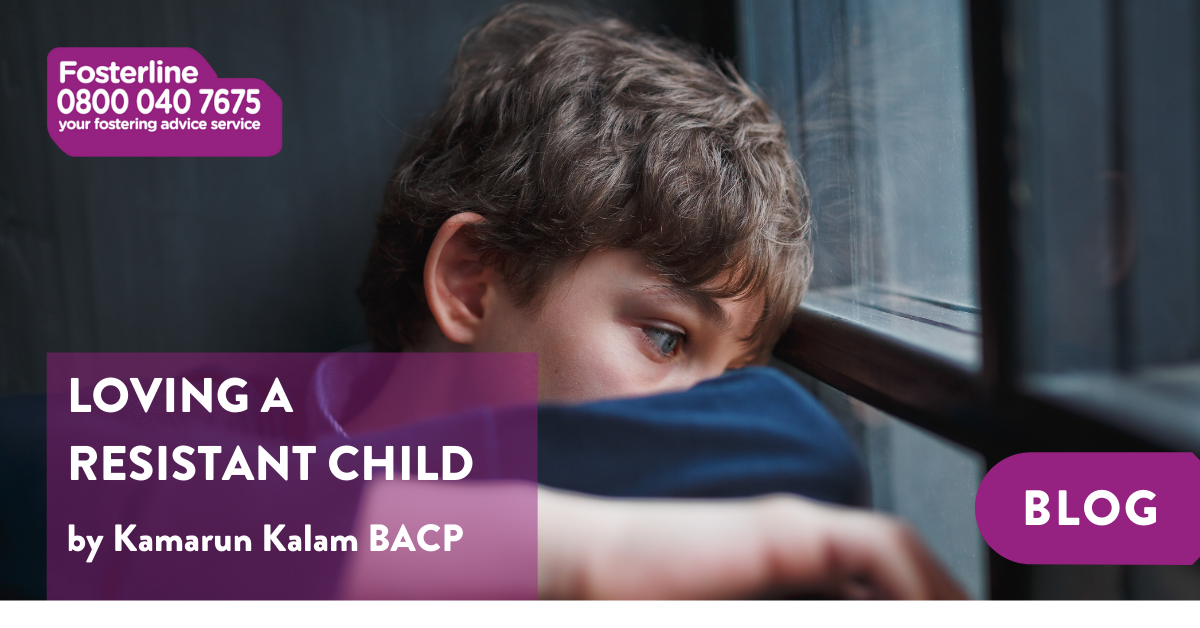
Parenting is one of the most challenging yet rewarding roles we will ever undertake. Raising children whether our own or foster children has its own unique set of challenges. The truth of the matter is that there is no single ‘right’ way to parent children. We are as unique as the children in our care. As such we have to speak the language of those around us, not just in speech, but in attitude, actions, and how we relate to one another.
Whilst we have different ways of expressing our love, some children are more receptive than others. The essence of fostering as with parenting in general is that the caregiver is able to make the child feel loved, accepted, valued and significant. So how do you show love to a resistant child? Well, by learning about the child, first and foremost by speaking to the professionals, and reading information on the child to understand their history.
There may be indicators on what to avoid, for example some children may be uncomfortable with physical touch, so being mindful of that when offering hugs would help. Where possible and age appropriate allow the child to lead you, speak to them about what they like and dislike. Get to know them and befriend them. Children often show you more than tell you their vulnerabilities and fears. It is important to gain insight and understanding by spending quality time with the child and allowing them the space and time to talk freely. Use encouraging words, open body language and a warm tone of voice.
ACCEPTANCE
Acceptance is key, the child needs to feel accepted and this cuts to the core of their being. Fostered children have often struggled with attachment disorders due to their separation from birth families. This can build resentment in them and a wall of defences that foster carers are often faced with when trying to connect with them. Some of this can be picked up reading their files, but mostly by spending time with and getting to know them. It’s not easy to manage a child who is challenging in their behaviours, but if you are able to make the child feel seen, heard, and understood the barriers will soon start to come down.
Patience is key, and a clear message from the outset that despite their past, or their behaviours, that you still believe in them, and that you care. Foster children often pick up on unspoken vibes. They can be acutely aware of what’s happening around them as they are often in a state of hyper vigilance checking if their new foster home and foster family are safe or not.
Foster children may have lived through experiences that have left them feeling judged, and internalised negative labels of being ‘un-loveable’ or ‘difficult’. Such thoughts often lead to challenging behaviours as a self -fulfilling prophecy causing a resistance to accepting kindness, compassion or love. Children who have never been shown love or acceptance by others often struggle to find it in themselves. They may feel suspicious of kindness, so baby steps would be helpful in such cases. Offer information, support and firm boundaries to help them to feel safe initially- maintain a routine so they know what to expect and keep them informed, consult them and make them feel a part of the family’s decision-making process. (This is for age-appropriate children old enough to understand).
SPEAK THE CHILD’S LANGUAGE
Use language that is understandable to the child, cut out the jargon and speak at the level of the child change your words, your actions, and your way of showing love and acceptance so that it is palatable to the child. Say things to the child that shows you value their uniqueness. Praise them on things they do well, encourage them to ask for help if they need it. Make time and space for them so that they know you are emotionally available for them. Tell your foster child how proud you are of them for small, and big achievements, and gestures both academic and nonacademic like helping with household chores or being kind and sharing or feeding a pet. Age-appropriate chores like tidying their bedroom, and setting the dinner table, etc, can help them feel more a part of the family. If you have a budding chef, get them involved in cooking and meal planning for the family.
Helping in these matters can offer your foster child a sense of belonging, confidence, acknowledgement, and a sense of real contribution. As you demonstrate your love and acceptance towards your foster child something magical happens, and they in turn can start to love and accept themselves. ‘Nurturing adult attachments provides children with protective, safe havens and secure bases from which to explore and engage with others and their environment’ (Bowlby, 1988). Above all else you must also remember to take care of yourself. Manage stress levels to reduce other demands on your time. Rest, sleep, exercise and eating healthy is not just essential for foster children but also for you as their carer. Factor in parenting breaks via respite care to help you relax and recharge your batteries as well so you can be your best self for the child.
– Kamarun Kalam BACP Acc Psychotherapist / Social Work England Reg & FosterLine Advisor
FURTHER INFORMATION
There is a publication indicating facts and figures about foster children’s emotional needs available here
Young Minds is a mental health charity for teens with a lot of resources www.youngminds.org.uk
